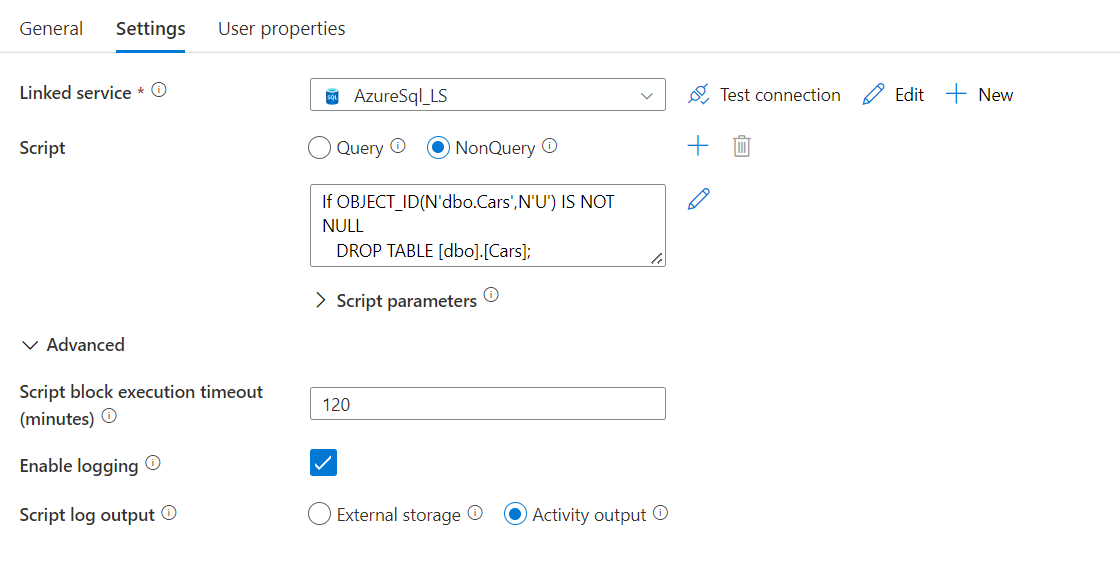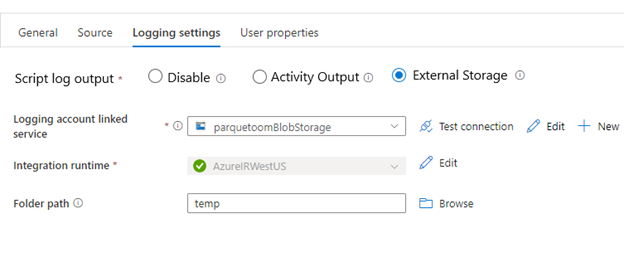Events
31 Mar, 23 - 2 Apr, 23
The ultimate Microsoft Fabric, Power BI, SQL, and AI community-led event. March 31 to April 2, 2025.
Register todayThis browser is no longer supported.
Upgrade to Microsoft Edge to take advantage of the latest features, security updates, and technical support.
APPLIES TO:  Azure Data Factory
Azure Data Factory  Azure Synapse Analytics
Azure Synapse Analytics
Tip
Try out Data Factory in Microsoft Fabric, an all-in-one analytics solution for enterprises. Microsoft Fabric covers everything from data movement to data science, real-time analytics, business intelligence, and reporting. Learn how to start a new trial for free!
You use data transformation activities in a Data Factory or Synapse pipeline to transform and process raw data into predictions and insights. The Script activity is one of the transformation activities that pipelines support. This article builds on the transform data article, which presents a general overview of data transformation and the supported transformation activities.
Using the script activity, you can execute common operations with Data Manipulation Language (DML), and Data Definition Language (DDL). DML statements like INSERT, UPDATE, DELETE and SELECT let users insert, modify, delete, and retrieve data in the database. DDL statements like CREATE, ALTER and DROP allow a database manager to create, modify, and remove database objects such as tables, indexes, and users.
You can use the Script activity to invoke a SQL script in one of the following data stores in your enterprise or on an Azure virtual machine (VM):
The script can contain either a single SQL statement or multiple SQL statements that run sequentially. You can use the Script task for the following purposes:
Here is the JSON format for defining a Script activity:
{
"name": "<activity name>",
"type": "Script",
"linkedServiceName": {
"referenceName": "<name>",
"type": "LinkedServiceReference"
},
"typeProperties": {
"scripts" : [
{
"text": "<Script Block>",
"type": "<Query> or <NonQuery>",
"parameters":[
{
"name": "<name>",
"value": "<value>",
"type": "<type>",
"direction": "<Input> or <Output> or <InputOutput>",
"size": 256
},
...
]
},
...
],
...
]
},
"scriptBlockExecutionTimeout": "<time>",
"logSettings": {
"logDestination": "<ActivityOutput> or <ExternalStore>",
"logLocationSettings":{
"linkedServiceName":{
"referenceName": "<name>",
"type": "<LinkedServiceReference>"
},
"path": "<folder path>"
}
}
}
}
The following table describes these JSON properties:
| Property name | Description | Required |
|---|---|---|
| name | The name of the activity. | Yes |
| type | The type of the activity, set to "Script". | Yes |
| typeProperties | Specify properties to configure the Script Activity. | Yes |
| linkedServiceName | The target database the script runs on. It should be a reference to a linked service. | Yes |
| scripts | An array of objects to represent the script. | No |
| scripts.text | The plain text of a block of queries. | No |
| scripts.type | The type of the block of queries. It can be Query or NonQuery. Default: Query. | No |
| scripts.parameter | The array of parameters of the script. | No |
| scripts.parameter.name | The name of the parameter. | No |
| scripts.parameter.value | The value of the parameter. | No |
| scripts.parameter.type | The data type of the parameter. The type is logical type and follows type mapping of each connector. | No |
| scripts.parameter.direction | The direction of the parameter. It can be Input, Output, InputOutput. The value is ignored if the direction is Output. ReturnValue type isn't supported. Set the return value of SP to an output parameter to retrieve it. | No |
| scripts.parameter.size | The max size of the parameter. Only applies to Output/InputOutput direction parameter of type string/byte[]. | No |
| scriptBlockExecutionTimeout | The wait time for the script block execution operation to complete before it times out. | No |
| logSettings | The settings to store the output logs. If not specified, script log is disabled. | No |
| logSettings.logDestination | The destination of log output. It can be ActivityOutput or ExternalStore. Default: ActivityOutput. | No |
| logSettings.logLocationSettings | The settings of the target location if logDestination is ExternalStore. | No |
| logSettings.logLocationSettings.linkedServiceName | The linked service of the target location. Only blob storage is supported. | No |
| logSettings.logLocationSettings.path | The folder path under which to store logs. | No |
Sample output:
{
"resultSetCount": 2,
"resultSets": [
{
"rowCount": 10,
"rows":[
{
"<columnName1>": "<value1>",
"<columnName2>": "<value2>",
...
}
]
},
...
],
"recordsAffected": 123,
"outputParameters":{
"<parameterName1>": "<value1>",
"<parameterName2>": "<value2>"
},
"outputLogs": "<logs>",
"outputLogsLocation": "<folder path>",
"outputTruncated": true,
...
}
| Property name | Description | Condition |
|---|---|---|
| resultSetCount | The count of result sets returned by the script. | Always |
| resultSets | The array which contains all the result sets. | Always |
| resultSets.rowCount | Total rows in the result set. | Always |
| resultSets.rows | The array of rows in the result set. | Always |
| recordsAffected | The row count of affected rows by the script. | If scriptType is NonQuery |
| outputParameters | The output parameters of the script. | If parameter type is Output or InputOutput. |
| outputLogs | The logs written by the script, for example, print statement. | If connector supports log statement and enableScriptLogs is true and logLocationSettings isn't provided. |
| outputLogsPath | The full path of the log file. | If enableScriptLogs is true and logLocationSettings is provided. |
| outputTruncated | Indicator of whether the output exceeds the limits and get truncated. | If output exceeds the limits. |
Note

Inline scripts integrate well with Pipeline CI/CD since the script is stored as part of the pipeline metadata.

Logging options:
Note
Billing - The Script activity will be billed as Pipeline activities.
See the following articles that explain how to transform data in other ways:
Events
31 Mar, 23 - 2 Apr, 23
The ultimate Microsoft Fabric, Power BI, SQL, and AI community-led event. March 31 to April 2, 2025.
Register todayTraining
Module
Code-free transformation at scale with Azure Data Factory - Training
Perform code-free transformation at scale with Azure Data Factory or Azure Synapse Pipeline
Certification
Microsoft Certified: Azure Data Engineer Associate - Certifications
Demonstrate understanding of common data engineering tasks to implement and manage data engineering workloads on Microsoft Azure, using a number of Azure services.
Documentation
Lookup activity - Azure Data Factory & Azure Synapse
Learn how to use the Lookup Activity in Azure Data Factory and Azure Synapse Analytics to look up a value from an external source. This output can be further referenced by succeeding activities.
ForEach activity - Azure Data Factory & Azure Synapse
The For Each Activity defines a repeating control flow in an Azure Data Factory or Azure Synapse Analytics pipeline. The For Each Activity is used for iterating over a collection to execute actions on each item in the collection individually.
Get Metadata activity - Azure Data Factory & Azure Synapse
Learn how to use the Get Metadata activity in an Azure Data Factory or Azure Synapse Analytics pipeline.